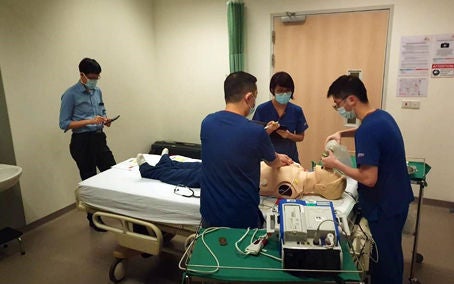
In 2020, the COVID-19 pandemic came upon all of us unexpectedly, causing increased physical separation at the workplace. This has affected the delivery of healthcare education, particularly for simulation-based training, which used to be carried out face-to-face with hands-on practice. Yet in light of the ongoing pandemic, it has become all the more essential to equip healthcare professionals with the relevant clinical skills and performance capabilities.
We speak to the Course Directors of SingHealth Duke-NUS Institute of Medical Simulation (SIMS) to find out how simulation training has evolved, despite the challenges posed by the COVID-19 pandemic.
+++
The Advanced Cardiac Life Support (ACLS) Certification Workshop equips healthcare professionals to carry out clinical interventions for life-threatening medical/cardiovascular emergencies. Before COVID-19, the course used to be carried out face-to-face, with as many as 60 healthcare professionals practicing the interventions in groups.
That came to a halt with the start of the pandemic.
"Initially, we had to suspend our face-to-face training due to the safety guidelines put in place," Prof Fatimah Lateef, SIMS Director and ACLS Course Director, shared. "However, ACLS is a foundational course which all practicing clinicians and certain groups of nurses need to be certified in. This meant that we needed to resume the ACLS workshop urgently, or else the back-log due to expiry of certification could be tremendous."
With that in mind, SIMS began to revamp the ACLS workshop format. Instead of the usual classroom lectures, an ACLS e-module was designed and rolled out in February this year. In the e-module, participants learn the theory behind the latest clinical interventions and test their knowledge by working through a series of eight potential scenarios. Following which, participants return on campus to physically practice the procedures in small groups of four, under the guidance of an instructor. (To find out more about the new hybrid format of the ACLS module, check out this paper that Prof Fatimah and her team wrote to share their experiences.)
"We used to conduct ACLS four to five times a month. Now, we run ACLS almost every day of the week to ensure that everyone’s certification is properly renewed," Prof Fatimah said. "COVID-19 has definitely made us more adaptable and open to change – which yields very exciting possibilities for the future of healthcare simulation."
 |  |
| A screenshot from one of the scenarios in the ACLS e-module | ACLS participants practicing the procedures in small groups |
"The pandemic has generated many innovative ideas about how we can continue simulation training despite restrictions. One way is through the adoption of technology e.g., computer-based/virtual simulation. We are also exploring the use of Serious Games and Virtual Reality/ Augmented Reality (VR/ AR) scenarios for the learning and assessment of healthcare professionals. One example is the Infusion Pump Serious Game which we are currently working on, where nursing staff in the Emergency Department learn to set up infusions using the pump system we have in the hospital. The immense detail of the game will be beneficial in guiding nurses to set up the right drug infusions, while ensuring that the learning continues in a safe environment."
Another simulation-based training workshop that was successfully restructured was the SIMS Simulation Educators Training (SIMS SET) Workshop, which teaches healthcare educators to design and run high-quality simulation based programmes. During the workshop, educators get a chance to craft and test out each other’s simulation training scenarios, gaining valuable feedback for improvement as they observe their scenarios playing out in real life.
Collaborative discussion and learning play a big role in the SIMS SET workshop. Throw safety measures into the mix, and it gets a little complicated.
"Part of the course is run virtually, where we teach topics like adult learning and debriefing. Scenario planning is also done in virtual breakout rooms. When participants meet on the second day of the course, it’s in small groups of five and a strict segregation policy is in place. During the testing of the scenarios - one group observes from the control room while the other acts as the ‘learners’ in the lab. The debriefing is then carried out via Zoom to minimise intermingling." Dr Chong Shin Yuet, SIMS SET Course Director shares.
 |  |
The SIMS SET workshop taking place both online and face-to-face | |
Yet, this workaround does pose some challenges as well.
"Virtual debriefing is so different from a physical debriefing. The traditional debriefing setting, where participants sit in a circle with no gaps in between so as to create closeness and encourage sharing, is no longer possible in the age of safe distancing. Since everyone is in masks, this also results in a difficulty in reading expressions or even hearing one another (since the mask tends to muffle voices)."
Given that debriefing is a key aspect of any simulation training, Dr Chong offers some tips to execute simulation-based training effectively in the new normal. "Preparation is crucial, especially when we rely heavily on technology. Dry runs help us ensure that there is adequate lighting and stable WIFI, so that the groups can communicate smoothly over Zoom. Familiarising ourselves with the different Zoom functions such as chats/polls, also helps us to draw inputs from quieter learners."
"It may not be as easy or straightforward carrying out simulation training in a COVID-19 world, but we do it because the need for simulation training has never been greater," Dr Chong says. "Different parts of the healthcare ecosystem, from medical/nursing schools to hospitals and institutions, are realising that simulation is likely the safest and most realistic recreation of clinical situations that learners can participate in without risking exposure to COVID-19. Safe simulation training is what enables our healthcare professionals to tackle the demands of the pandemic and provide excellent care for our patients."
***
Keen to see how you can incorporate simulation-based training into your healthcare teaching? Speak to the SIMS team at sims@singhealth.com.sg.













 Get it on Google Play
Get it on Google Play